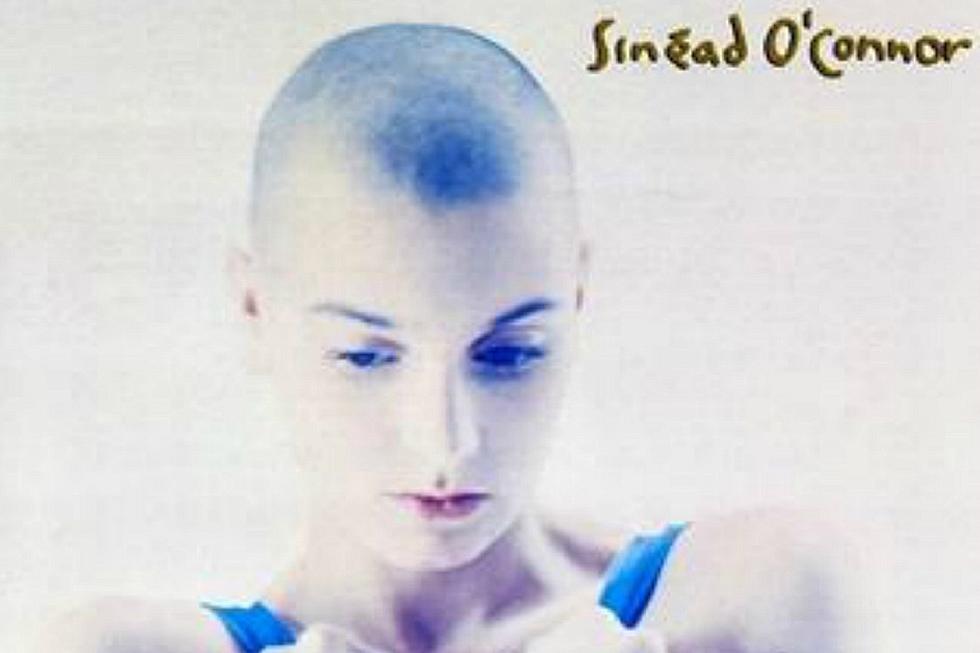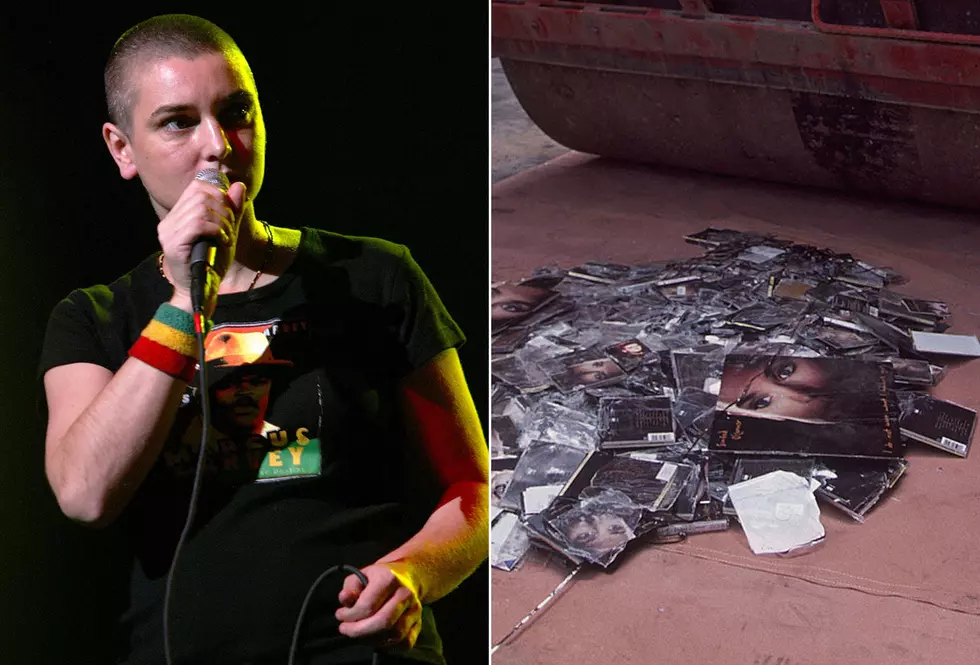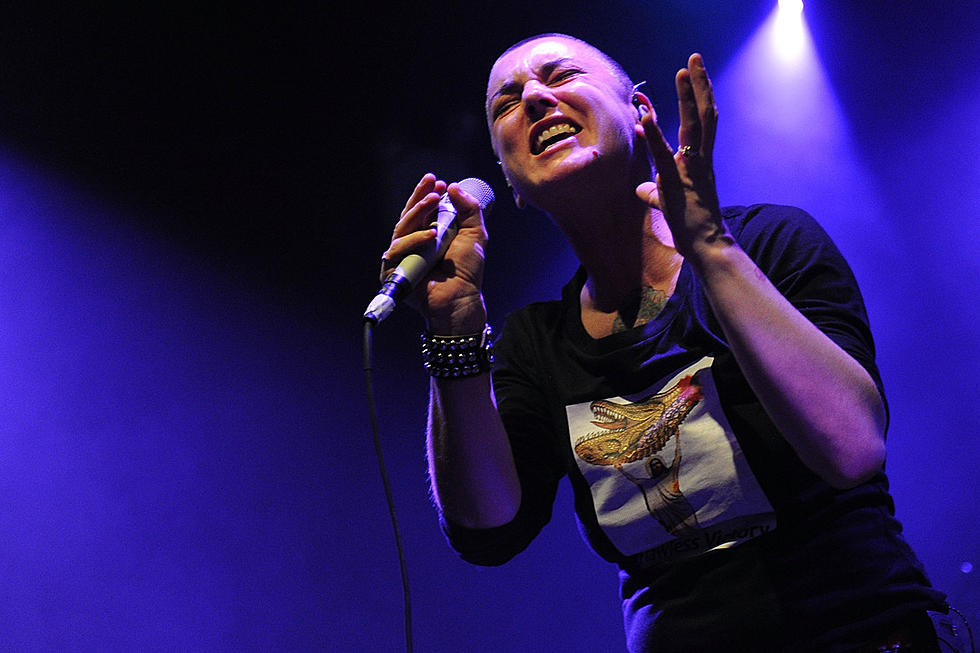25 Years Ago: Sinead O’Connor Tears Up a Photo of the Pope on ‘Saturday Night Live’
In 1992, long before there was a Spotlight movie, nearly a decade before its scandals became front-page news, Sinead O'Connor was fed up with the Catholic church. Angry and frustrated with a culture that irreparably harmed children, she struck the heart of the organization in an unlikely and unexpected way. The Irish singer-songwriter's moment came on Oct. 3 of that year, during her appearance as the musical guest on NBC's Saturday Night Life.
The artist who first came on the scene with the Grammy-nominated 1987 album The Lion and the Cobra performed an a cappella cover of Bob Marley's "War." The track comes from his 1976 album with the Wailers, Rastaman Vibration, which drew its anti-apartheid song's lyrics come from an Oct. 4, 1963 United Nations speech by Ethiopian Emperor Haile Selassie.
But O'Connor changed some of these lyrics to represent the plight of abused youth rather than racial inequality. As she sang about the children, she held up a photo, as she had done in rehearsal. "We have confidence in good over evil," she sang, except where she had previously brandished an image of orphaned children, she was now holding one of Pope John Paul II — and tearing it up, tossing its tattered pieces at the camera. "Fight the real enemy," she said defiantly.
The very photo had been on her own mother's wall since 1978, she told the Irish magazine, Hot Press, according to the Guardian.
The studio was stunned into silence but critics swiftly raised their voices, with NBC receiving approximately 4,400 calls in response to O'Connor's actions. Only a handful of the calls were in praise. The network had no prior knowledge of O'Connor's plans, but chose not to edit the performance for the delayed West Coast broadcast, although reruns of the episode use O'Connor's rehearsal footage instead.
But that O'Connor would take a radical stance is itself not unexpected. The artist was on the rise, especially with her 1990 hit Prince cover "Nothing Compares 2 U" off of her second album I Do Not Want What I Haven't Got. But her fame was also being fueled by her political pronouncements. In 1989, she announced her support for the Irish Republican Army, before renouncing it the next year. A year later, she refused to perform in New Jersey if the "Star Spangled Banner" were played before the concert began. And in 1991, she refused to accept a Grammy Award for Best Alternative Album, as a protest against the commercialism of the awards show.
The act itself, the form of protest she employed on Saturday Night Life, was inspired by Bob Geldof. She told Hot Press, "When the Boomtown Rats went to No. 1 in England with Rat Trap, [Bob] Geldof went on Top of the Pops and ripped up a photo of John Travolta and Olivia Newton-John, who had been No. 1 for weeks and weeks before. And I thought, 'Yeah, f---! What if someone ripped up a picture of the pope?' Half of me was just like: 'Jesus, I'd love to just see what'd happen.'"
A week later as Saturday Night Live's host, Joe Pesci displayed the same tattered photo during his monologue, saying he had taped it back together. He received huge applause. "She's lucky it wasn't my show. Cause if it was my show, I would have gave her such a smack," he added.
During an Oct. 16 Bob Dylan tribute at New York City's Madison Square Garden, she witnessed the backlash in person. She took to the stage to perform "I Believe in You," but boos stopped it before she could begin singing. She fought back by singing "War" again, then Kris Kristofferson, the master of ceremonies for the evening, went out and gave her a big hug, telling her "don't let the bastards get you down."
Saturday Night Live mocked her and Kristofferson's part in the Dylan event later that season.
Kris Kristofferson Stands By Sinead O’Connor
It certainly wasn't the only public outcry against her protest. Days after the concert, a 30-ton steamroller in front of Chrysalis Records' Rockefeller Center offices crushed an enormous pile of records, cassettes and CDs bearing O'Connor's name. The event was put together by the National Ethnic Coalition of Organizers, which promised to donate $10 to charity for every one of her albums sent in. They received more than 200.
"Under our system of government Sinead O'Connor has every right to do what she did, but we also have the right to express ourselves," said Arnold Burns, president of the organization, but their plans to send the collection of smashed album bits to O'Connor failed when she couldn't be located.
Her spokeswoman at the time, Elaine Shock, responded, "How are they going to get it to her? I don't even know where she is. It's not like Santa Claus where you can address him in care of the North Pole. It can't be 'Sinead O'Connor, Europe.'"
Around the same time, O'Connor sent a letter to dozens of news organizations. "The only reason I ever opened my mouth to sing was so that I tell my story and have it heard," she wrote. "My story is the story of countless millions of children whose families and nations were torn apart in the name of Jesus Christ."
A month after the SNL appearance, she further explained herself in an interview with Time.
"It's not the man, obviously—it's the office and the symbol of the organization that he represents," she said. "In Ireland we see our people are manifesting the highest incidence in Europe of child abuse. This is a direct result of the fact that they're not in contact with their history as Irish people and the fact that in the schools, the priests have been beating the s--- out of the children for years and sexually abusing them. This is the example that's been set for the people of Ireland. They have been controlled by the church, the very people who authorized what was done to them, who gave permission for what was done to them."
O'Connor went on to connect her own childhood abuse to the Catholic church. "Sexual and physical. Psychological. Spiritual. Emotional. Verbal. I went to school every day covered in bruises, boils, sties and face welts, you name it. Nobody ever said a bloody word or did a thing," she said. "Naturally I was very angered by the whole thing, and I had to find out why it happened... The thing that helped me most was the 12-step group, the Adult Children of Alcoholics/Dysfunctional Families. My mother was a Valium addict. What happened to me is a direct result of what happened to my mother and what happened to her in her house and in school."
This was hard to grasp for Americans, who, in 1992, weren't as familiar with the abuse of the Catholic church and ensuing cover-ups. But a decade later, in an interview with Salon, O'Connor noted, "It's very understandable that the American people did not know what I was going on about, but outside of America, people did really know and it was quite supported and I think very well understood."
On 2005's Throw Down Your Arms, O'Connor released a studio version of her take on "War."
Though she has often maintained that she has no regrets about her Saturday Night Live performance, in 1997, in an interview with the Italian newspaper Vita, O'Connor asked the church for forgiveness.
The Top 100 Alternative Albums of the '90s
More From Diffuser.fm









